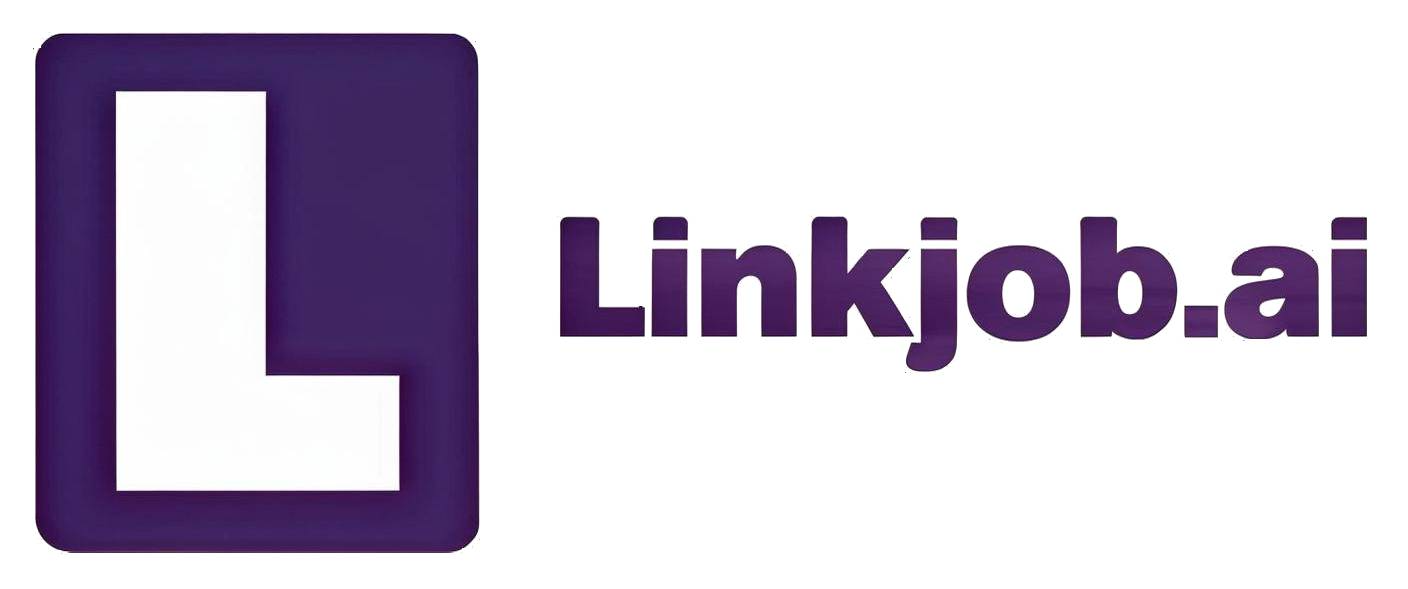The Best AI tools for job interviews I've tried-My Top 8 Picks
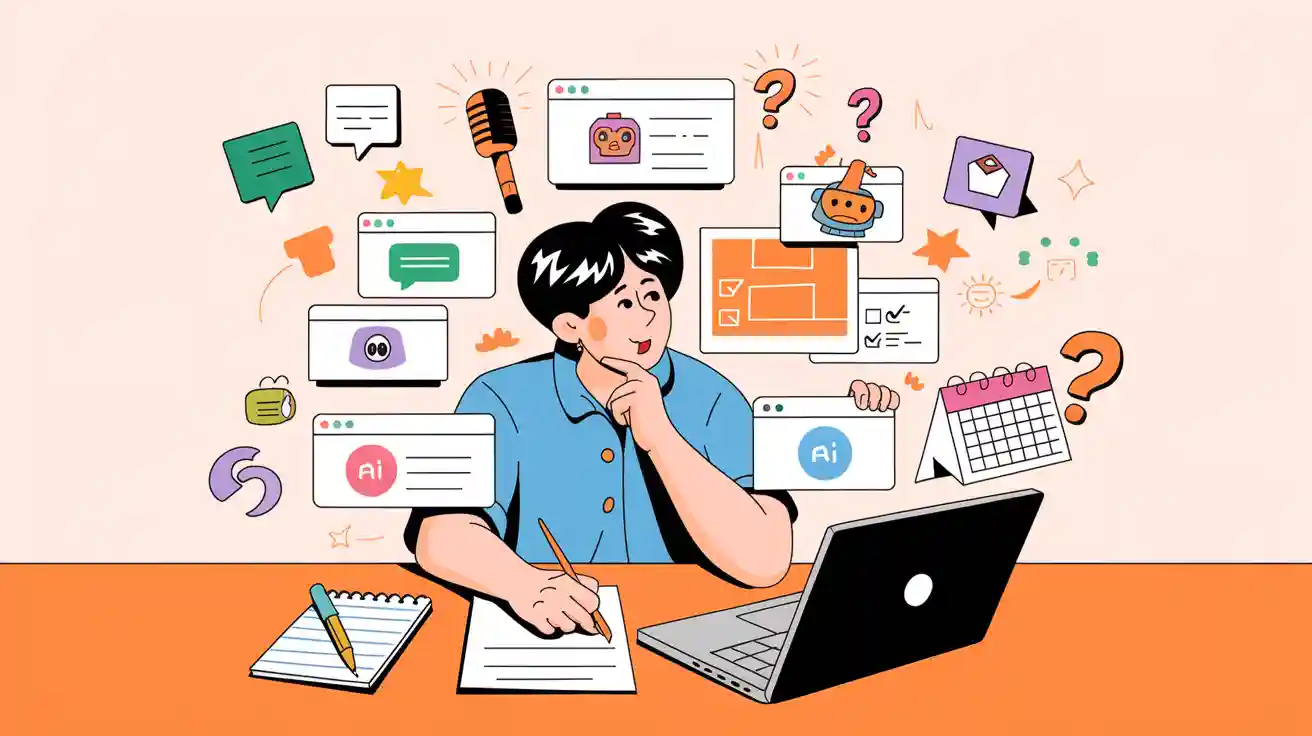
Ever wished you could have the best AI tool for nailing every job interview? Me too!
Over the past few weeks, I've been testing different AI interview prep tools. Some were incredibly intuitive and helpful, while others felt a bit clunky or limited in scope.
In this article, I'm sharing the 10 best AI tools for interviews that I really love. I'll tell you what I liked, what I didn't, and which ones are best for different requirements. Read on to find the perfect AI interview tool for you!
1.Linkjob.ai - Best AI Tool for Interviews Overall
2.Google's Interview Warmup - Best AI Tool for Free Basic Practice
3.Yoodli - Best AI Tool for Communication and Speech Feedback
4.Teal-Best AI Interview Prep Tool For Realistic Practice With Performance Analytics
5.Richard McMunn’s Interview Coach-It can simulate Richard's teaching method
6.Final Round AI - The most comprehensive AI interview preparation tool
7.Exponent Practice -Best AI interview tool for peer-to-peer model
8.Career.io- offers the most complete career services package
Linkjob.ai - Best AI Tool for Interviews Overall
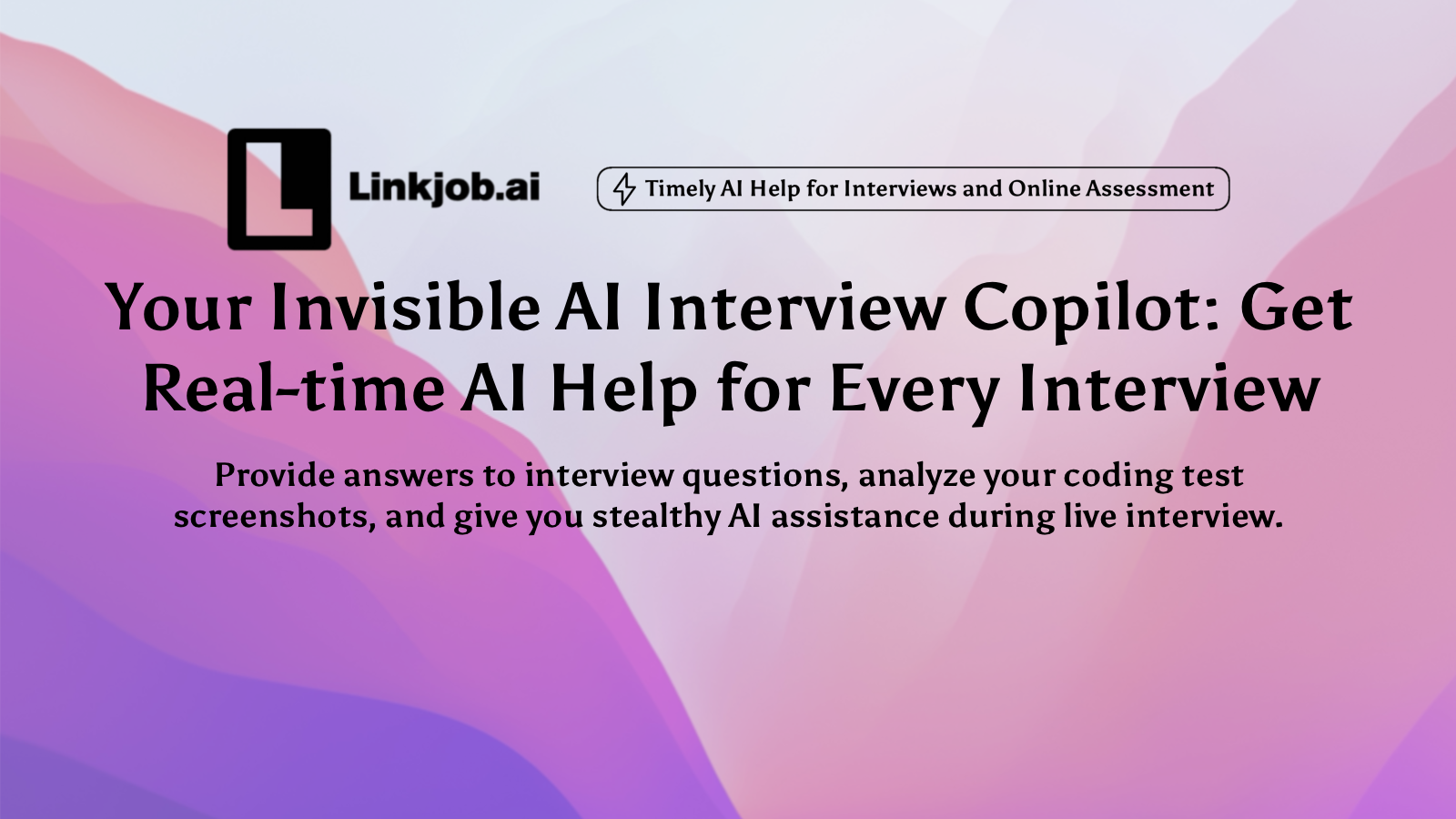
Linkjob.ai is one of the most versatile tools for preparing for job interviews with AI. It’s super easy to use and feels like it was made for anyone—no deep tech knowledge required.
With Linkjob.ai, you can access tailored guidance for tech and finance roles, including real-time answer suggestions during live interviews and intelligent mock sessions. It saves you time by combining features like customized feedback, behavioral question practice, and even salary negotiation tips all in one platform.
Linkjob.ai allows you to simulate interviews based on job descriptions, generate personalized responses, and track your progress with AI-driven insights. You can also practice consistent responses for common scenarios, like behavioral or case study questions, or even refine your delivery with voice analysis.
One of the things you'll like is how customizable it is. You can adjust the interview difficulty, focus on specific industries, and tweak settings to match the company you're applying to.
It also has a ton of AI-powered effects, like real-time prompting during video calls and post-interview analysis to highlight strengths and weaknesses. These let you create polished, confident performances using your own experiences.
Pros: Peerless AI interview assistance capabilities, Multiple feedback and simulation options, Various customization for tech/finance roles, Realistic response generation
Cons: Only a 30-minute trial period, and it performs best in the tech and finance sectors, while in other fields it's just at a normal level.
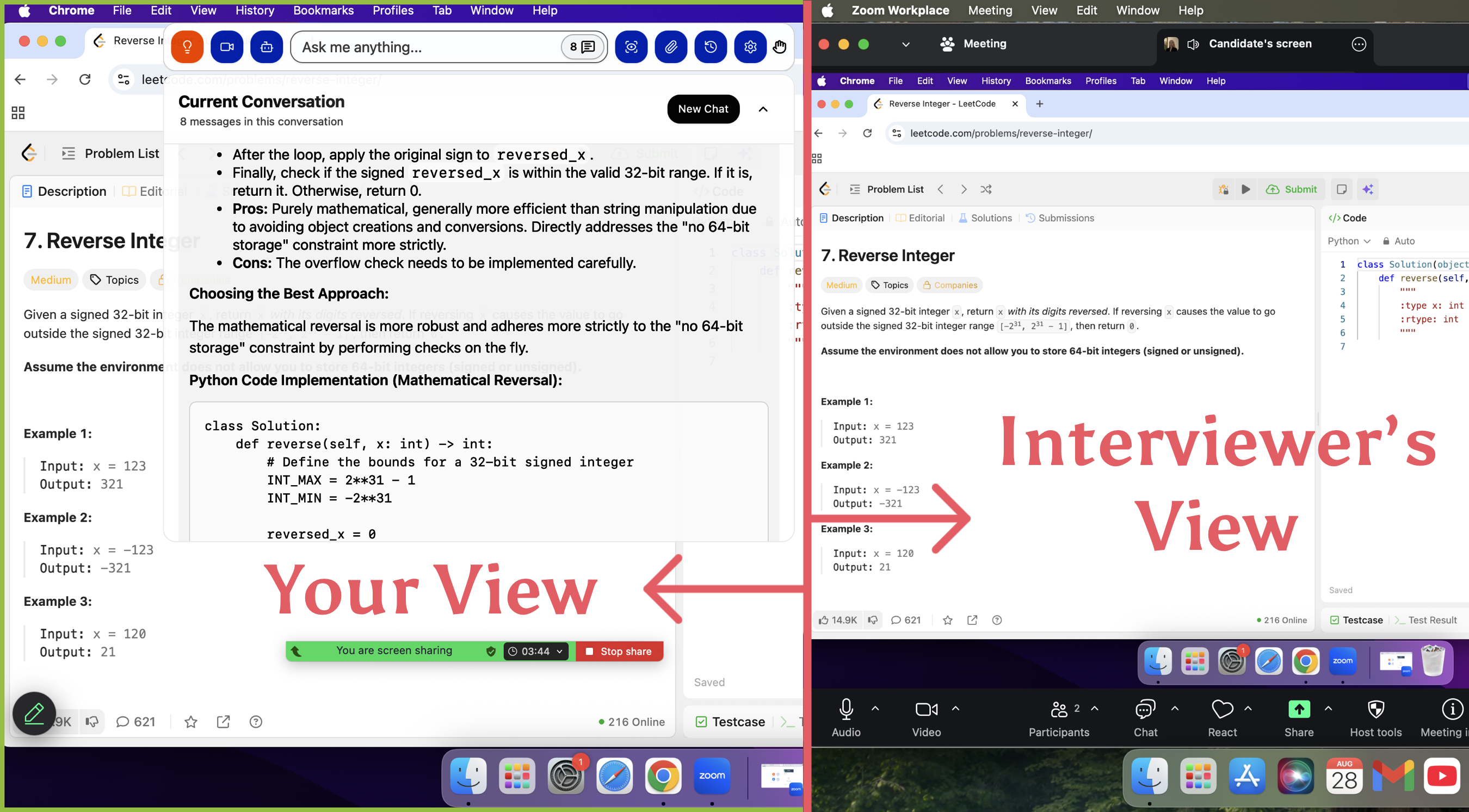
Google's Interview Warmup - Best AI Tool for Free Basic Practice
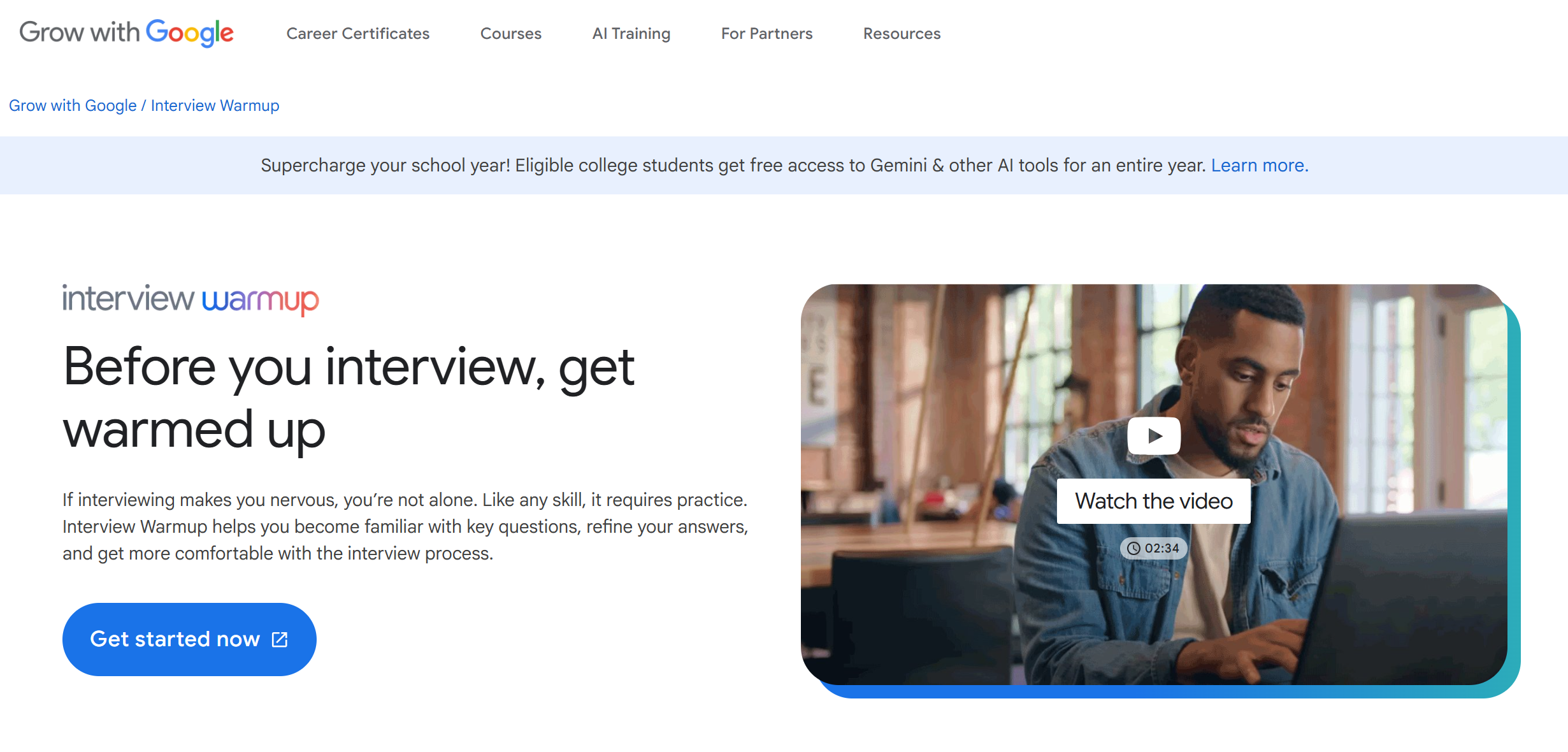
Google's Interview Warmup is another amazing AI tool that’s definitely worth checking out!
Created by Google, this free tool makes it super easy to practice common interview questions across fields like data science, marketing, or project management. Whether you’re prepping for behavioral questions or job-specific scenarios, it brings your practice to life.
One of my favorite parts is the huge library of pre-made questions. It’s a great way to explore different topics, get inspired, and build foundational skills for your interviews.
Another feature I found helpful is its transcription and insight tool. It analyzes your spoken answers for clarity, filler words, and relevance, helping you improve on the spot.
Pros: Completely free access, Field-specific question sets, Instant speech analysis
Cons: It's only suitable for basic practice and entry-level short-answer interviews, and it still falls short compared to professional AI interview tools.
Yoodli - Best AI Tool for Communication and Speech Feedback
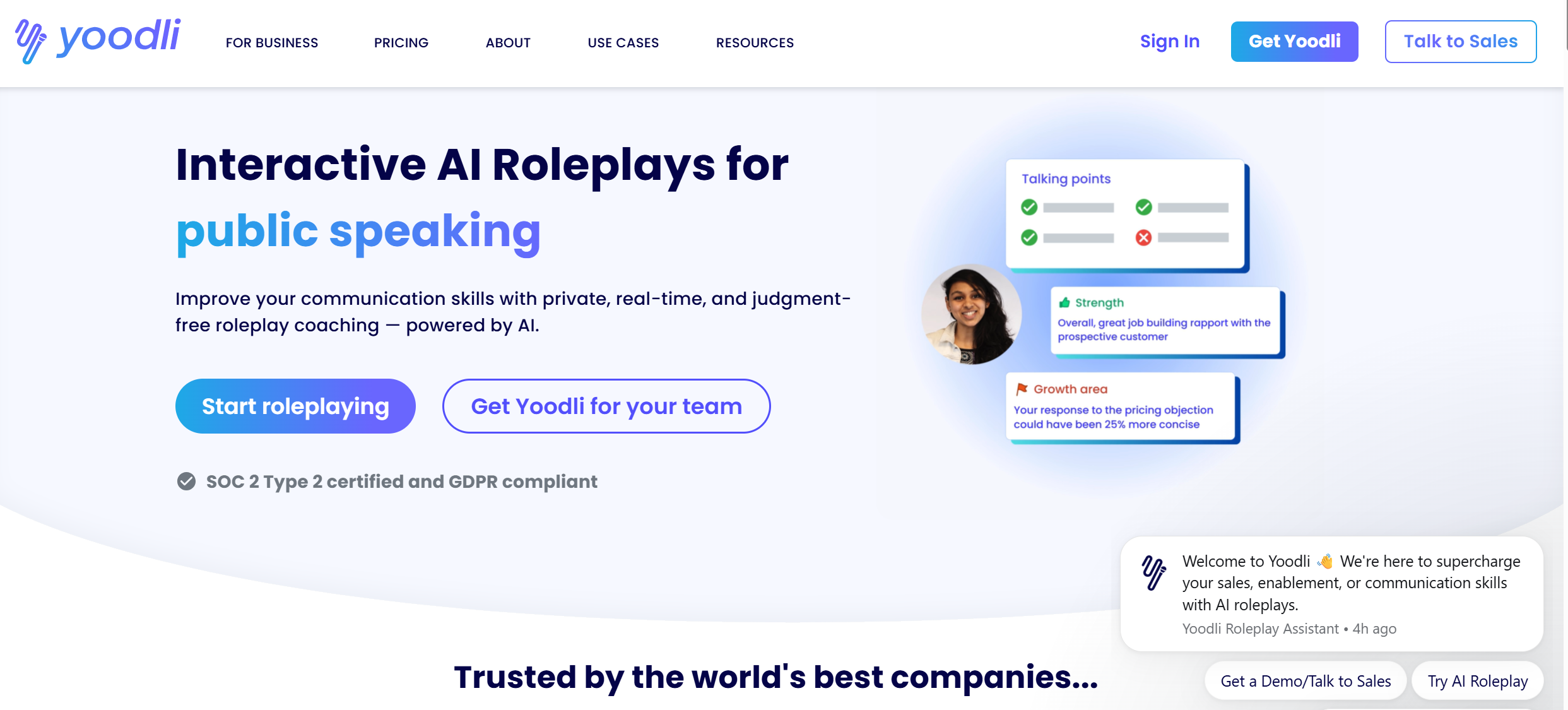
Yoodli is an AI-powered tool designed to assist users in improving their communication and public speaking skills through analysis and feedback. One of its core features is speech analytics, which evaluates recorded practice sessions for aspects like filler words, pacing, and audience engagement, helping users refine their delivery. It also includes a feedback mechanism that provides AI-generated suggestions to iterate on responses. Additionally, the tool offers a public speaking practice mode that incorporates elements such as body language tips, which can be applied to scenarios like interview preparation. Integration with platforms like Zoom allows for incorporation into daily workflows for repeated practice.
Pros: Detailed analysis of speech and delivery, Intuitive recording interface, Quick generation of feedback
Cons: Limited options for customizing practice questions, Greater emphasis on delivery aspects compared to content depth
Teal-Best AI Interview Prep Tool For Realistic Practice With Performance Analytics
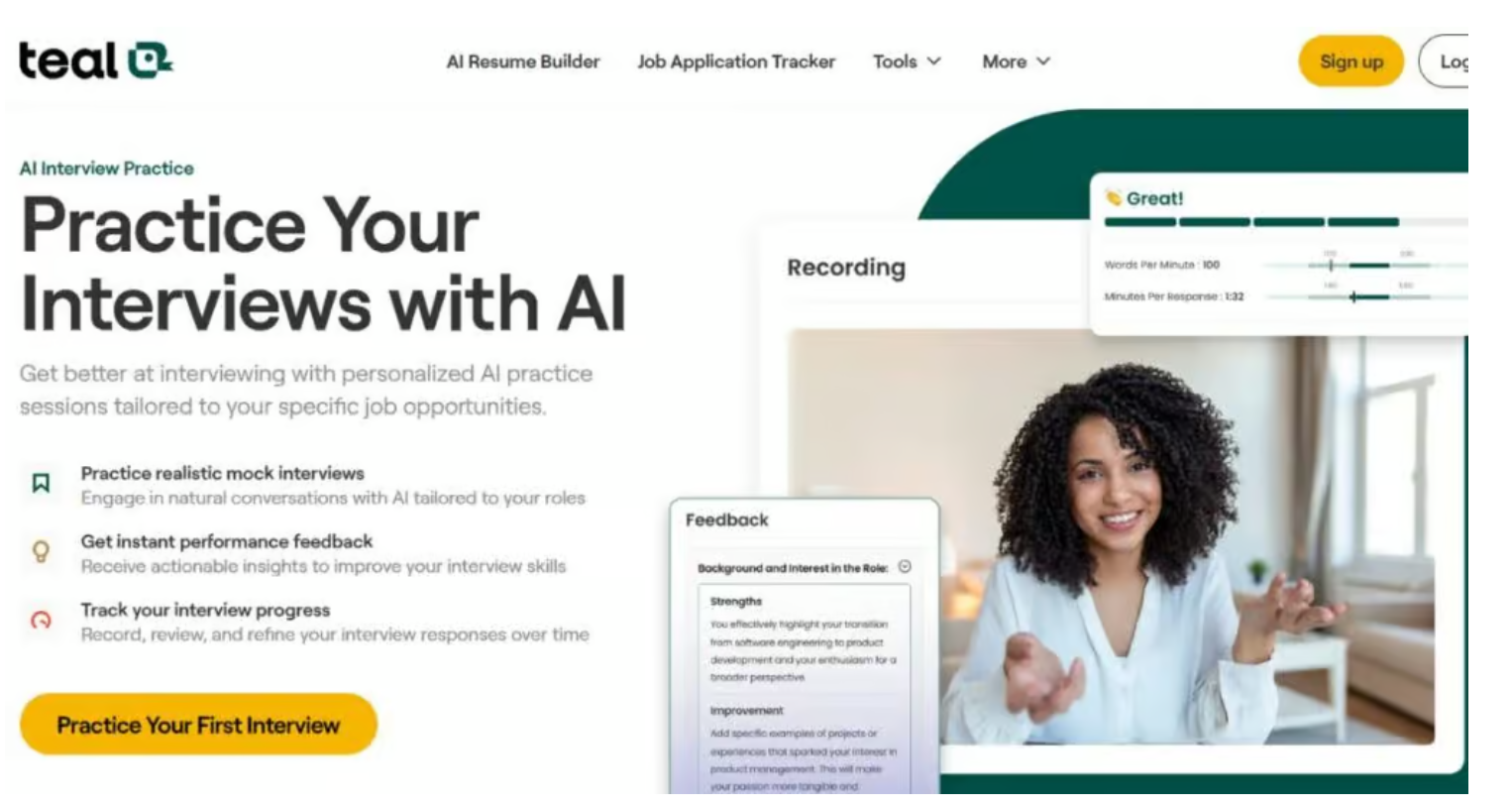
Teal is an AI-powered tool designed to assist users in preparing for job interviews through realistic practice and performance analytics. One of its core features is personalized mock interviews, which tailor questions to specific job roles and formats like screening, technical, or cultural fit, allowing users to engage in natural conversations with an AI interviewer that mimics real scenarios.
It also includes instant feedback mechanisms that evaluate responses for aspects like speaking pace, response quality, and engagement, providing actionable recommendations to refine answers.
Additionally, the tool offers video recording and live transcription of practice sessions, which can be reviewed to improve body language, tone, and delivery, applicable to various interview preparation needs.
integration with job search platforms and progress tracking allows for monitoring improvement over time and incorporating practice into daily job hunting workflows
Pros: Realistic simulation of interview conversations, Detailed instant feedback and analytics, Flexible practice anytime with role-specific tailoring
Cons: Limited sessions and credits in the free tier, Requires premium subscription for unlimited access and advanced features
Richard McMunn’s Interview Coach-It can simulate Richard's teaching method
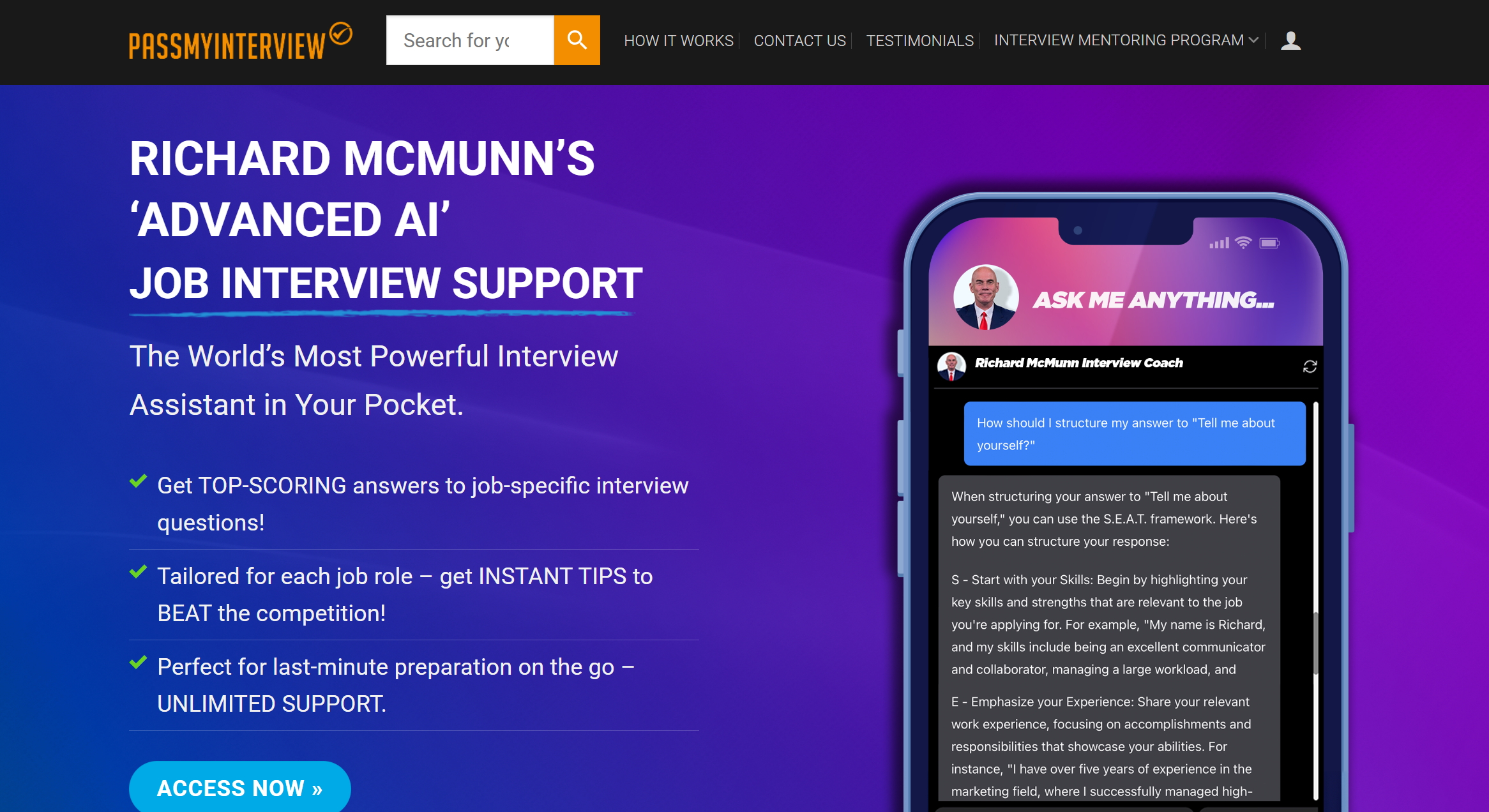
Richard McMunn’s Interview Coach is an AI-powered tool designed to assist users in preparing for job interviews by simulating Richard McMunn's proven teaching methods through personalized coaching and interactive practice. One of its core features is tailored mock interviews, which adapt questions to specific job roles, experience levels, and sectors like tech, sales, or customer service, enabling users to engage in realistic scenarios with an AI that mimics expert guidance based on McMunn's extensive methodology.
Additionally, the tool provides access to bonus resources such as downloadable guides on tough questions, resume templates, and masterclasses, which can be reviewed to enhance overall preparation, body language advice, and closing strategies applicable to various interview needs
Integration with user-uploaded resumes and job descriptions, along with continuous updates on interview trends, allows for monitoring progress over time and incorporating targeted practice into daily preparation routines.
Pros: Suitable for users who trust Richard McMunn. Integration of proven expert methodology for natural and effective practice, 24/7 access with instant personalized feedback and bonus materials
Cons: the price of 79.9 US dollars per month is relatively expensive., Limited emphasis on advanced behavioral or technical scenarios in some cases.
Final Round AI - The most comprehensive AI interview preparation tool
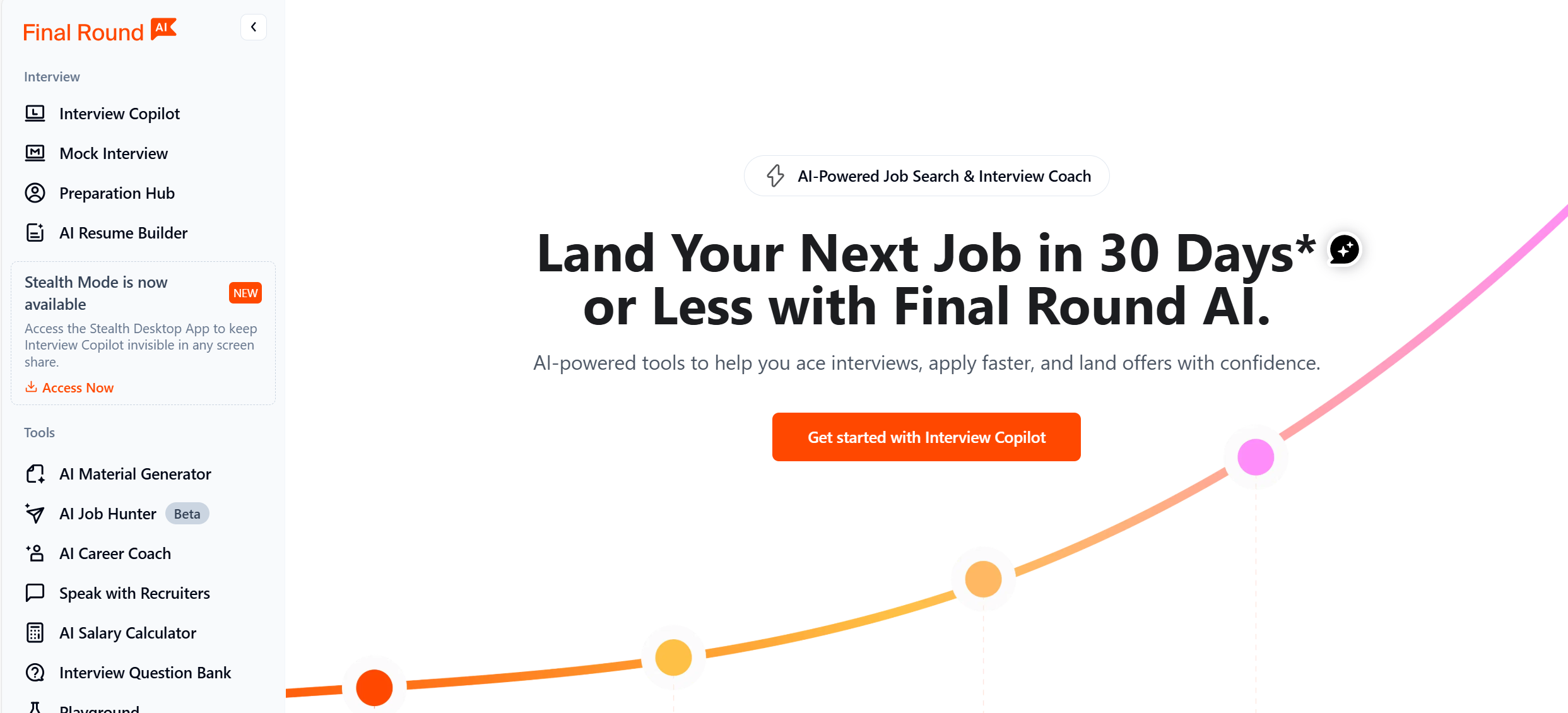
I tried Final Round AI as a tool for interview preparation, and it functioned like a digital assistant providing guidance during practice sessions. It offers immediate suggestions and feedback, which works in both solo rehearsals and simulated calls. It offers a wide array of AI tools for job interview preparation, which felt a bit overly complex for me.
There were some limitations: The tool occasionally experienced delays on mobile devices, and suggestions could seem somewhat general for highly specialized positions. Additionally, I had to manually adjust the AI parameters myself, and in most cases, I didn't think it was necessary to do so.
Pros: Real-time assistance in interviews, In-depth response evaluations, Resume enhancement features.
Cons: The price is very high, requiring 148 US dollars per month, Relies heavily on accurate user inputs
Exponent Practice -Best AI interview tool for peer-to-peer model
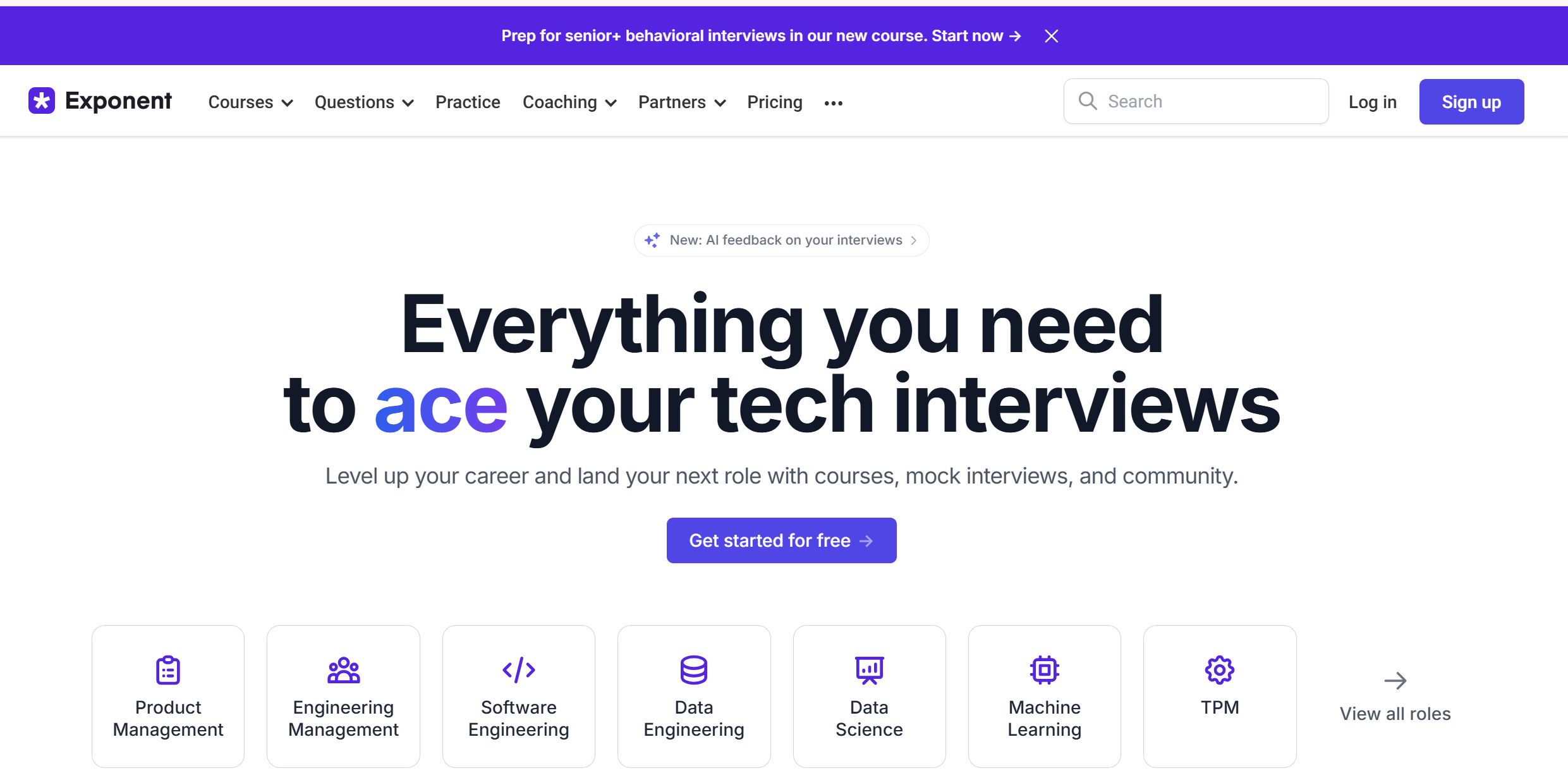
Exponent Practice is an AI-powered tool designed to assist users in preparing for job interviews by simulating peer-to-peer interactions through live mock sessions and automated feedback, focusing on technical and behavioral skills in a collaborative environment.
One of its core features is peer-to-peer mock interviews, which pair users with professionals of similar experience levels and target roles in sectors like software engineering, product management, or data science, enabling users to engage in realistic scenarios where they alternate between interviewing and being interviewed, with mutual guidance based on shared insights and feedback
Additionally, the tool provides access to AI-driven solo practice sessions, including on-demand audio chats with popular interview questions, downloadable transcripts, feedback rubrics on communication and problem-solving, and tips for tough scenarios, which can be reviewed to enhance overall preparation, body language advice, and strategies applicable to various technical interview needs
Pros: Suitable for users who value real peer collaboration. Integration of peer-to-peer model with AI-enhanced feedback for natural and effective practice, free to start with 24/7 access, instant insights, and community learning
Cons: Limited free sessions and dependency on peer availability in some cases
Career.io- offers the most complete career services package
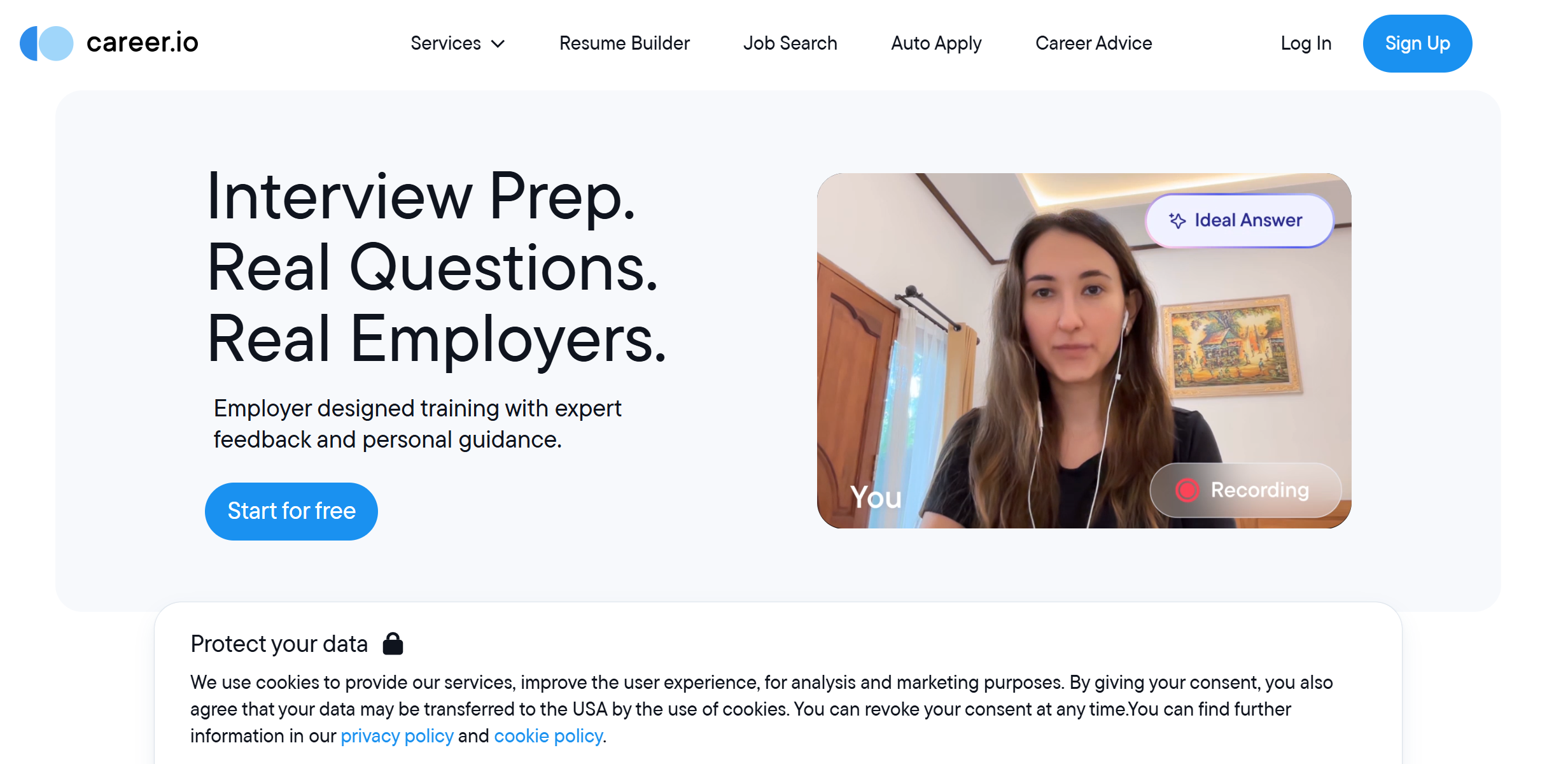
Career.io is an AI-powered platform designed to provide end-to-end career services, assisting users in job searching, resume optimization, and career advancement through a suite of tools and expert guidance.
One of its core features is the AI-powered resume builder, which creates and optimizes resumes to match job descriptions, beat applicant tracking systems (ATS), and include recruiter-friendly templates for download in Word or PDF formats.
It also includes a job search engine that aggregates listings from various boards, with tools like a job tracker, automated applications via a Chrome extension, and personalized matching to streamline the hunt
Pros: Comprehensive suite covering job search to advancement, AI efficiency in automation and personalization, Access to expert coaching and large job databases
Cons: The interview tool is just one of the features, and it may not be professional enough, Heavy reliance on AI could overlook nuanced human elements in career advice.
Final Words
Hopefully this list has helped you find your best AI tool for interviews.
If you're still unsure, my advice is to start with a few that seem suitable for your needs. Play around with their free plans for a couple of mock sessions before committing to a paid version.
And if you need an all-round option, I suggest you take a look at Linkjob.ai. You'll be amazed at its extensive features for tech and finance, real-time support, and powerful simulations.
FAQ
What are AI tools for job interviews?
AI tools for job interviews are software platforms that use artificial intelligence to help you prepare for job interviews. They can simulate mock interviews, provide real-time feedback on your responses, analyze your speech and delivery, generate customized questions based on job descriptions, and offer tips for improvement. These tools make prep more efficient and targeted, especially for roles in tech, finance, and other competitive fields.
How do I choose the right AI interview tool for me?
It depends on your needs! If you're looking for an all-in-one solution with real-time assistance and customization for tech or finance roles, start with Linkjob.ai—it's my top overall pick. For speech feedback, go with Yoodli. Consider factors like your industry, whether you need free options (like Google's Interview Warmup).I recommend trying free plans first to see what fits.
Are these AI interview tools free to use?
Many offer free plans or trials, but with limitations. For example, Google's Interview Warmup is completely free for basic practice, and tools like Yoodli or Linkjob.AI have generous free tiers. Others, like Final Round AI requires subscriptions for advanced features like unlimited sessions or premium feedback. Always check the tool's website for current pricing—most start with free access to get you hooked!
How did you select these top AI interview tools?
I tested dozens of tools over weeks, focusing on ease of use, features, realism, feedback quality, and value for money. I prioritized ones that delivered consistent results, had positive user reviews, and catered to various needs like speech analysis or industry prep. My picks are based on hands-on experience, and I updated them as of my testing period to reflect the latest capabilities.

